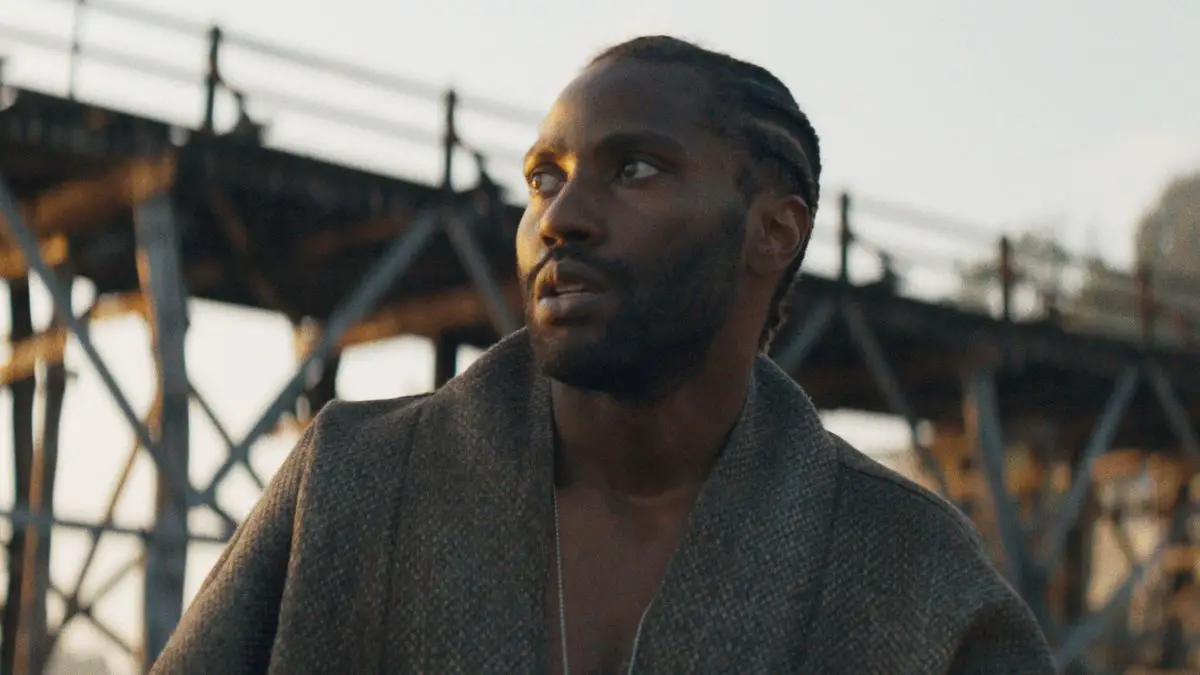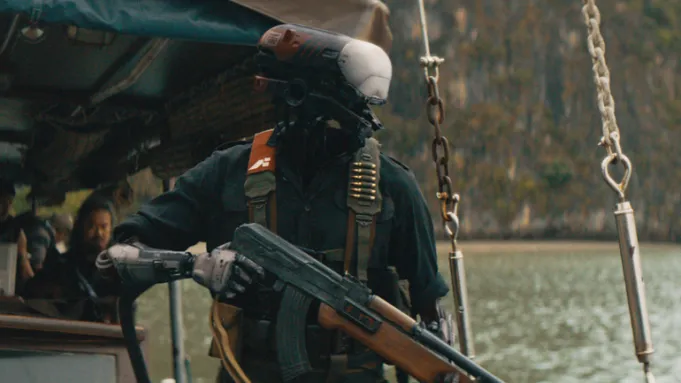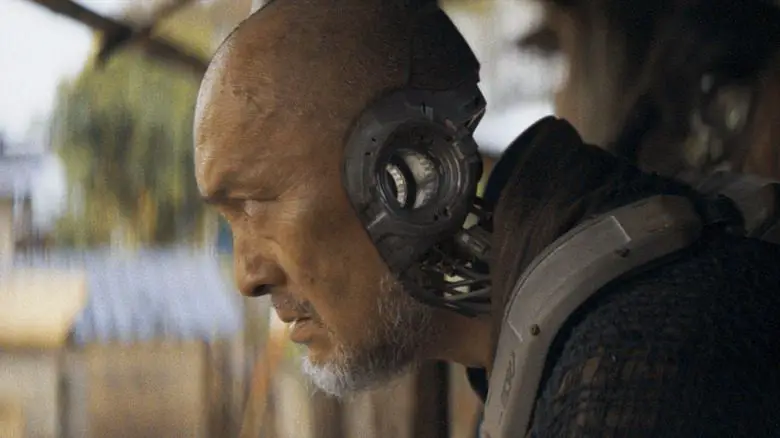Vapid sci-fi with imagery pretty enough to make for an excellent background on your computer should, at the very least, be fun, if not have a few ideas in its head. Sadly, Gareth Edwards’s The Creator is ponderous, easy-on-the-eyes, navel-gazing on Artificial Intelligence. The film ensconces itself in safe mediocrity that, despite being a mainstream Hollywood movie casting a critical eye on the military, refuses to be anything but a titanic bore.
The script is the real culprit, written by Edwards and Chris Weitz, who have both done good work before and shall no doubt do so again. But here, The Creator comes off like a bargain basement version of every 90s television sci-fi show, only with a bigger budget, less poetics, and politics that, despite being the driving force, seems unmoored from anything and anyone.

Edwards has taken the time-honored sci-fi story of exploring the equally time-honored tradition of humans’ uneasiness with the ever-forward advancement of AI. Set in the far-flung world of 2065, where America has outlawed AI because they nuked Los Angeles, leaving “New Asia” a haven for the now hunted AI, The Creator starts off hinting it might have a few things on its mind. Instead, Edwards and Weitz fall into traps of Occidental mythology spread thinly over the tired (and racist) trope of Orientalism.
The script is a gaunt exercise in forcing Western mythology on a story set steeped in the East. The US government sends Joshua (John David Washington) to New Asia to find the AI’s newest weapon, who turns out to be a half-human, half-AI child, Alphie (Madelne Yuna). Alphie is the AI’s last hope against the humans, who won’t rest until all AI has been eradicated. Brace yourself for a lot of variations of “They’re not human, it’s just programming.”
It doesn’t help that, being set in Asia, all the AI, mostly Simulants, which are robots with human faces grafted onto them, are all Asian, making the metaphor that AI is a sentient race worthy of freedom and respect feel more racially charged than either Edwards or Wesitz may have intended. Intention or not, it doesn’t matter because it only becomes more eye-rollingly shallow as the story of Alphie and Joshua plays out over a series of a man with no conviction slowly turning into a man with conviction but in the most rote and mechanical way possible.
Underpinning all of this is how Weitz and Edwards have pumped so much Christian imagery into a movie whose landscapes are painted with Buddhist temples and robots draped in ashrams and prayer beads. The Creator reeks of appropriation, which is ironic considering how anti-colonialist, anti-military, and anti-jingoistic the movie tries to be. For a film so intent on being trans-humanist, it fails to understand basic humanity. The Creator is so busy getting high on its own supply it never stops to realize that it’s not even the good stuff.
However, The Creator has a few things going for it. They don’t save the movie but help it feel slightly less interminable. For one, the different types of robots are fun. Though I wish we had fewer Simulants, I understand, from a visual perspective, why. It’s easier to convey emotion and convince the audience that they feel when they have human features. Still, I would have much rather Edwards rose to the challenge and given us actual robots without human features as characters, if only because I found them to be the most interesting.
Yuan’s portrayal of Alphie is pure joy. It’s a pity that Edwards squandered such an infectious performance in all this convoluted slop. Effortless and captivating, she never gives a false note despite the script’s continual attempt to trip her up.
Throughout The Creator, in the background or off in the corner, you see robots smoking or, if they do interact with our characters, being dickish in a way I found refreshing. The decent, calm, serene Simluants, despite being played by the likes of Ken Watanabe and Gemma Chan, were dull in comparison. Not to mention the bomb robots, bulky trash can-looking things that run into the crowd and blow up, were far and away the most fascinating robots in the movie.
They had a personality and, what’s more, were used by the US government. If you’re wondering why the US was using AI as weapons but was also hunting down AIs, join the club. Neither Wetiz nor Edwards go through the trouble of admitting how messy categorizing AI can be and instead try to make it a black-and-white matter, despite New Asia using AI for their police force and the US still using AI to kill…AI.

Look, The Creator is such a lazy movie that it has Allison Janney in a role we don’t usually get to see Allison Janney in and doesn’t realize she’s walking away with the film. Janney plays Colonel Howell, a believer in the cause, who hunts down Joshua once he turns rogue and wants to kill Alphie because of the threat he poses. Janney’s Howell is the highlight of the movie, and it’s a damn shame she doesn’t get to do more because every line of hers comes from a place of fury and passion that feels so clear and decisive from a movie this muddled and half-baked.
The threat Alphie poses is to end the war. Or, more specifically, to destroy Nomad, a massive battle station that floats above the Earth’s atmosphere like a miniature version of a death star. The world is a police state, with New Asia apparently okay with the US “spy” scanning its country. The Creator alludes to complexity, but what passes for sophistication is merely the movie not giving much thought to anything.
There’s a moment in which Watanabe’s character Harun tells Joshua that if the AI wins, nothing will happen to the West. “We just want to be free.” In addition to that, Harun tells him a vital piece of information that recontextualizes the bombing of Los Angeles, and Washington’s Joshua seems unfazed. The movie seems unbothered by this paradigm-shifting information and forgets about it within seconds.
All the while, Greg Fraser and Oren Soffer give us beautiful panoramic landscapes after beautiful panoramic landscapes. But the beauty is facile because the imagery feels empty, and the aesthetic feels cheap, especially when Fraser, Soffer, and Edwards take imagery meant to remind us of footage from the Vietnam War newsreel footage or other war movies. These moments feel false because the politics within the world feel so ill-thought-out.
For example, the AI police of New Asia are also after Alphie and Joshua, willing to kill those who try to protect them. But why? We understand why the US military doesn’t want the war to end or why they want to eradicate AI, but why does the AI being utilized by the New Asian government feel threatened by the end of the war? Again, the existence of AI police and AI rebels suggests that AI has developed its unique political ideologies. However, since no one says anything during The Creator, conversations being either dreary exposition or humorless didactic philosophizing, it never comes across.

Neither does Fraser and Soffer’s framing help make anything clear. It’s all so muddled, but it looks good enough that if you don’t think about it too hard, you might trick yourself into thinking you’re watching a movie with thought. Instead, it’s an exercise in self-importance but pretending to engage with a concept. The concept is the uneasy relationship between humans and AI, and at what point in that relationship do they go from tools to slaves? Beyond that, what does the world look like?
Towards the end of The Creator, Joshua, and Alphie are running through the airport, and we hear over the PA announce the flight departure for the Moon. The Creator is so uninterested in its own world that it created; this is the first time we are told there are regular flights to the Moon! THE MOON!?
Are there flights to other planets? Have we colonized? Who cares? The Creator doesn’t; it barely cares about its own story.
Images courtesy of 20th Century Studios
Have strong thoughts about this piece you need to share? Or maybe there’s something else on your mind you’re wanting to talk about with fellow Fandomentals? Head on over to our Community server to join in the conversation!

